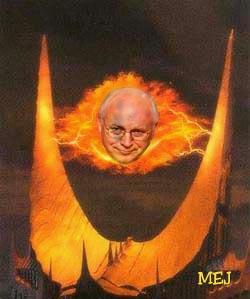 Dick Cheney is still intent on bringing on Armageddon before he leaves office or his cyborg body gives up the ghost. The road to Armageddon leads through Iran and this has resulted in a power struggle between the Vice President's office and the saner heads in the Defense and State Departments and some of the Intelligence community.
Dick Cheney is still intent on bringing on Armageddon before he leaves office or his cyborg body gives up the ghost. The road to Armageddon leads through Iran and this has resulted in a power struggle between the Vice President's office and the saner heads in the Defense and State Departments and some of the Intelligence community.Spooks refuse to toe Cheney's line on Iran
WASHINGTON - The US National Intelligence Estimate (NIE) on Iran has been held up for more than a year in an effort to force the intelligence community to remove dissenting judgments on the Iranian nuclear program. The aim is to make the document more supportive of Vice President Dick Cheney's militarily aggressive policy toward Iran, according to accounts provided by participants in the NIE process to two former Central Intelligence Agency (CIA) officers.Porter tells us the John Negroponte would not go along with the Cheney tribe on Iran and that's why he was replaced by Mike McConnell to be director of national intelligence. McConnell was willing to go along with the insanity of the Cheney Tribe. But the consensus is still not there and the NEI still contains dissenting views. So what will the Bush/Cheney cabal do? What they always do - declassify the parts of the NIE that support them and leave the dissenting views classified.
But this pressure on intelligence analysts, obviously instigated by Cheney himself, has not produced a draft estimate without those dissenting views, these sources say. The White House has now apparently decided to release the "unsatisfactory" draft NIE, but without making its key findings public.
A NIE coordinates the judgments of the US's 16 intelligence agencies on a specific country or issue.
A former CIA intelligence officer who has asked not to be identified told Inter Press Service (IPS) that an official involved in the NIE process says the Iran estimate was ready to be published a year ago but has been delayed because the director of national intelligence wanted a draft reflecting a consensus on key conclusions - particularly on Iran's nuclear program.
There is a split in the intelligence community on how much of a threat the Iranian nuclear program poses, according to the intelligence official's account. Some analysts who are less independent are willing to give the benefit of the doubt to the alarmist view coming from Cheney's office, but others have rejected that view.
The draft NIE, first completed a year ago, which had included the dissenting views, was not acceptable to the White House, according to the former intelligence officer. "They refused to come out with a version that had dissenting views in it," he says.
As recently as early October, the official involved in the process was said to be unclear about whether a NIE would be circulated and, if so, what it would say.
[.....]
"The White House wants a document that it can use as evidence for its Iran policy," says Giraldi. Despite pressures on them to change their dissenting conclusions, however, Giraldi says some analysts have refused to go along with conclusions that they believe are not supported by the evidence.
In October 2006, Giraldi wrote in The American Conservative that the NIE on Iran had already been completed, but that Cheney's office had objected to its findings on both the Iranian nuclear program and Iran's role in Iraq. The draft NIE did not conclude that there was confirming evidence that Iran was arming Shi'ite insurgents in Iraq, according to Giraldi.
Giraldi said the White House had decided to postpone any decision on the internal release of the NIE until after the November 2006 congressional elections.
The decision to withhold key judgments on Iran from the public was apparently part of a White House strategy for reducing the potential damage of publishing the estimate with the inclusion of dissenting views.Nothing will stand in the way of Cheney's Armageddon - certainly not the worthless House and Senate.
As of early October, officials involved in the NIE were "throwing their hands up in frustration" over the refusal of the administration to allow the estimate to be released, according to the former intelligence officer. But the Iran NIE is now expected to be circulated within the administration in late November, says Ray McGovern, former CIA analyst and founder of the anti-war group Veteran Intelligence Professionals for Sanity.
The release of the Iran NIE will certainly intensify the bureaucratic political struggle over Iran policy. If the NIE includes both dissenting views on key issues, a campaign of selective leaking to news media of language from the NIE that supports Cheney's line on Iran will soon follow, as well as leaks of the dissenting views by his opponents.
Both sides may be anticipating another effort by Cheney to win Bush's approval of a significant escalation of military pressure on Iran in early 2008.

This is not the first time Cheney has tried to manipulate the intelligence community:
ReplyDeletehttp://www.motherjones.com/news/feature/2002/01/political_intel.html
http://www.fas.org/sgp/congress/2007/barlow.html
Those links show that he was involved in suppressing information about Pakistan's nuclear program (when the first Bush was president, incidentally). If Congress had known, they would have had to suspend arms sales to Pakistan. That would have complicated our foreign policy, as we depended on Pakistan in our efforts to strengthen the Afghan rebels (who were fighting the Soviets). Of course, now we need Pakistan to help in our fight against those same rebels.
In any case, the suppression of that intelligence had terrible consequences. It allowed AQ Kahn to engage in nuclear arms proliferation -- including sales to Iran.
Frankly, it makes me worry that our government wanted nuclear proliferation.